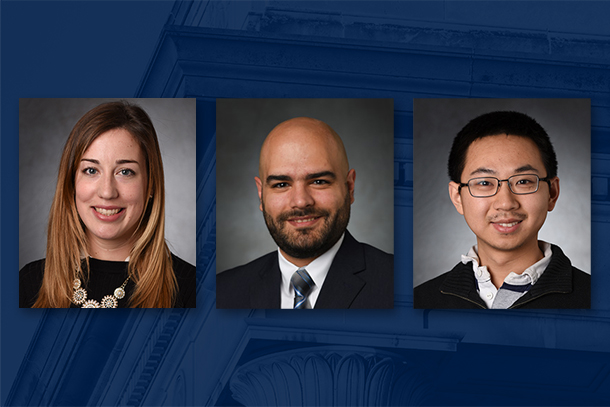
Jessica Menold, Joseph Najem and Xiang Yang each received a three-year $450,000 award from the Air Force Office of Scientific Research's Young Investigator Award program.
Three engineering professors earn national recognition
Jessica Menold, Joseph Najem and Xiang Yang named Air Force Young Investigators
February 16, 2023
By Mary Fetzer
UNIVERSITY PARK, Pa. – Three College of Engineering faculty received awards from the 2023 Air Force Office of Scientific Research (AFOSR) Young Investigator Research Program (YIP). Jessica Menold, Hartz Family Career Development Assistant Professor in the School of Engineering Design and Innovation and the Department of Mechanical Engineering; Joseph Najem, assistant professor of mechanical engineering; and Xiang Yang, assistant professor of mechanical engineering, each received a three-year $450,000 research grant.
Jessica Menold: Trust and Influence program
AFOSR’s Trust and Influence program supports research to “build the scientific foundations for designing high-performing, mixed humans-machine teams based on the fundamental ways humans establish, maintain and repair trust in other humans and agents,” according to the website of the Air Force Research Laboratory (AFRL), which houses AFOSR.
“The successful control and maximum utilization of air, space and cyberspace is dependent on the completion of complex tasks, objectives and missions outside the capabilities of any one warfighter,” Menold said. “Teams are critical to the mission of the Air Force, but complex social dynamics, cognitive biases and individual traits can render teams less effective.”
A neutral external party to manage team processes could help to create trust and maintain a heathy team climate, according to Menold. Researchers studying human-computer interactions are beginning to leverage machine agents as team managers, yet little is known about the way human facilitators affect team decision making and performance.
Menold will use her grant to identify the behavioral, physiological, and communicative signals of trust that take place during complex team collaborations. With this information, she will build a model of team trust and psychological safety as a function of the behaviors and actions of human facilitators. If successful, the work lays the foundation to investigate the use of artificial intelligence to manage human teams; leveraging findings, Menold can train artificial agents to mirror the behavioral and communicative cues of human facilitators to manage human teams more effectively.
Joseph Najem: Mechanics of Multifunctional Materials and Microsystems program
AFOSR’s Mechanics of Multifunctional Materials and Microsystems program “seeks to establish the fundamental understanding required to design and manufacture new aerospace materials, nanoscale devices and microsystems for multifunctional structures to predict their performance and integrity based on physical principles,” according to the AFRL website.
Najem aims to fabricate multifunctional hydrogel power sources inspired by electric fish with organs that produce electrical discharges for predation and defense. The goal is to create a similar self-sustainable power source for in-body applications. Recent studies, he said, have demonstrated hydrogel-based power sources that, like in an electric eel, move charged ions across selective membranes to produce power.
“The surface of an electric fish is covered with many papillae that increase surface area to reduce internal resistance maximize current,” Najem said. “We want to use a droplet-based printing approach to fabricate hydrogel batteries that replicate this with complex surface topology between the gel layers to allow current densities that are comparable to the fish.”
The proposed power sources — biocompatible, biodegradable, flexible, stimuli-responsive and capable of recharging within the body — would be ideal for powering implantable biological devices aimed at assessing and monitoring the well-being of military personnel, according to Najem.
“Tracking physiological data on soldiers and pilots during missions can make them safer and more resilient and help commanders define their mission parameters,” he said. “This is achievable with wearable or implantable biomonitoring devices that predict human performance, but current devices are constrained by the amount of power available. Our novel fabrication method aims to yield batteries that uniquely meet all the needs of implantable batteries for extended in-body powering.”
Xiang Yang: Unsteady Aerodynamics and Turbulent Flows program
AFOSR’s Unsteady Aerodynamics and Turbulent Flows program supports “basic research into the dynamics and control of aerodynamic shear flows and emphasizes the characterization, modeling, prediction and control flow instabilities, turbulent flows and aerodynamic interactions,” according to the AFRL website.
Yang will use his award to develop a turbulence model with advanced ‘human thinking’ machine learning tools and numerical simulation data. Conventional data-enabled turbulence modeling involves a single training against a group of data. However, according to Yang, the resulting model effectively breaks when exposed to additional data and requires retraining.
“My proposal differs from current work in this field in that it emphasizes extrapolation, which is achieved through progressive ‘human thinking’ machine learning,” he said. “We will use mathematical properties that allow us to control a network’s behavior when extrapolating and add neutral corrections to an existing working model without breaking it.”
Yang, who anticipates extensive collaboration with the Wright-Patterson Air Force Base, wants to show validation of his models in a range of cases — shear flows, boundary-layer flows, wake flows and separated flows — that can handle system rotation, wall curvature and pressure-gradient effects better than existing models can.



